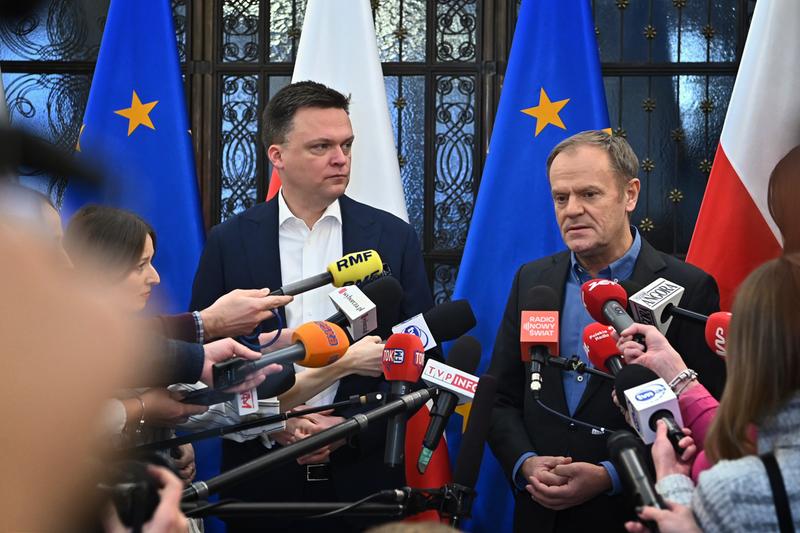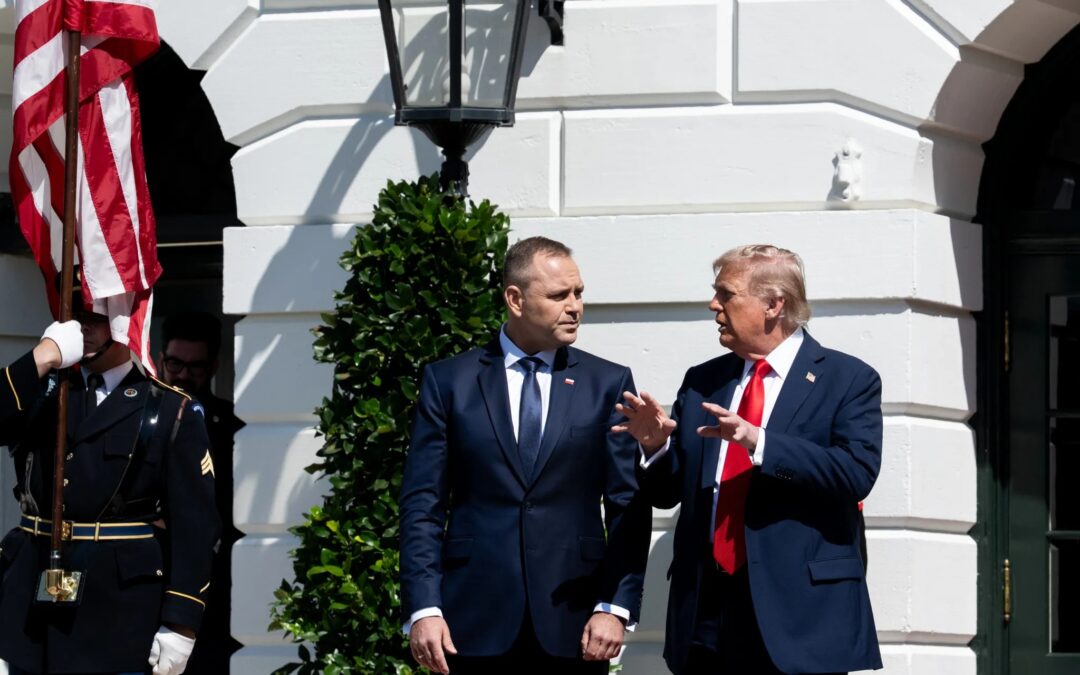Keep our news free from ads and paywalls by making a donation to support our work!

Notes from Poland is run by a small editorial team and is published by an independent, non-profit foundation that is funded through donations from our readers. We cannot do what we do without your support.
By Aleks Szczerbiak
The imminent resignation of a TV-personality-turned-politician from the leadership of the nominally “anti-duopoly” liberal-centrist party that he founded threatens the ruling coalition’s cohesion and stability. To remain in office after the next election, it will need a replacement pro-government party that can appeal to voters looking for “newness”.
Crucial for Tusk’s victory
The liberal-centrist Poland 2050 (Polska 2050) is a junior partner in the current ruling coalition – led by Donald Tusk, leader of the Civic Coalition (KO – former Civic Platform, PO), a larger liberal-centrist grouping – which came to office in December 2023.
Poland 2050 was formed to capitalise on TV personality-turned-politician Szymon Hołownia’s relatively successful 2020 presidential election bid when he finished a strong third with 14% of the votes in the first round.
At one point, Poland 2050 looked like it could emerge as the main challenger to the right-wing Law and Justice (PiS) grouping, the country’s ruling party between 2015-23.
In an exclusive interview, independent presidential candidate @szymon_holownia talks with us about his political profile and experience, climate policy, foreign affairs, defence, the church, 500+, and LGBT rights https://t.co/dsn5k86yrz
— Notes from Poland 🇵🇱 (@notesfrompoland) June 20, 2020
However, given his international standing and high domestic media profile, the return to frontline Polish politics of Tusk as leader of PO in 2021 re-energised his party. Poland 2050’s fortunes waned and Hołownia appeared to be a spent force politically.
In the run-up to the autumn 2023 parliamentary election, Poland 2050 formed an eclectic electoral alliance with the agrarian-centrist Polish People’s Party (PSL) called the Third Way (Trzecia Droga) and, following a strong showing in the only televised party leaders’ debate, Hołownia was able to recapture the “newness” that characterised his 2020 presidential campaign.
The Third Way’s claim to transcend the PO-versus-PiS duopoly that has dominated Polish politics for the last 20 years resonated with many voters and it finished third with 14.4%.
The Third Way thereby played a crucial role in the current governing parties’ electoral victory, acting as an effective channel for picking up uncertain voters who were disillusioned with the PiS government but reluctant to return Tusk to office.
Too aligned with the Tusk government
After the election, Hołownia was able to secure the high-profile post of speaker of the Sejm, the more powerful lower parliamentary chamber and second most senior state office after the president, on a rotational basis for two years. Hołownia used his experience as a TV presenter to create a humorous and engaging spectacle (dubbed “Sejmflix”), which he hoped would provide him with a springboard for another presidential election bid in summer 2025.
In fact, Hołownia’s popularity proved short-lived as interest in his showman-like performances inevitably waned. He also alienated core liberal-left voters when, in March 2024, he postponed work on legislation aimed at liberalising Poland’s restrictive abortion law until after the first round of voting in April’s local elections.
The left and centre-right wings of the ruling coalition have clashed over the speaker of parliament's decision to delay bills that would end Poland's near-total abortion ban.
He says they should not be debated amid the campaign for April's local elections https://t.co/GAv3YWrvwG
— Notes from Poland 🇵🇱 (@notesfrompoland) March 6, 2024
This announcement was met with anger from many, especially younger government supporters, for whom this had been a touchstone issue in the parliamentary election. They felt that Hołownia was delaying the debate because some PSL local election candidates were afraid of offending local parish priests, who remain influential among its small-town and rural core electorate.
However, Hołownia’s biggest problem was that, having won support on the grounds that he represented “newness” and a “third way”, he was unable to carve out an independent political space distinct from the main governing party. Beyond eloquence and good intentions, Hołownia clearly lacked the political skills and dexterity required to explain what specific ideas or policies he wanted to replace the dominant duopoly with.
By joining the KO-dominated government, Poland 2050 became wholly associated with the main governing party as a loyal and uncritical junior partner. This made it extremely difficult for Hołownia’s party, and the Third Way more generally, to carve out an independent profile for themselves as simultaneously challenging the duopoly while being perceived to be so closely aligned with one side of it.
As a consequence, Poland 2050 voters started to either identify more strongly with KO as the main governing party, support opposition groupings that appeared to offer a more credible “newness” – such as the radical right free-market Confederation (Konfederacja) – or simply drop out of politics altogether.
Hołownia’s attempt in this summer’s presidential election to present himself as an equidistant arbiter between the two dominant political camps was wholly unconvincing and he finished fifth with just under 5% of the votes.
A belated bid for autonomy
Following his presidential election defeat, the two parties that comprised the Third Way announced that they would contest the next elections separately, forcing Hołownia to look for other ways to advance his political project.
At the same time, Hołownia realised that he had aligned himself too closely with the Tusk government and tried to assert a more independent stance, turning into the ruling coalition’s most vocal internal critic.
This included a controversial late-night meeting with PiS leaders and making it clear that he would not countenance blocking the swearing-in of the new PiS-backed President Karol Nawrocki when Tusk and other KO leaders questioned the election’s legitimacy; Hołownia claimed that he had been encouraged to initiate a “coup”, a term that he later retreated from. Hołownia also insisted that Poland 2050 should designate a deputy prime minister when he stood down as Sejm speaker in November.
Then, in September, he joined eight other Poland 2050 deputies in voting with the opposition to allow a bill proposed by Nawrocki ensuring that the government completes construction of a planned “mega-airport” and transport hub known as the Central Communication Port (CPK), one of the previous administration’s flagship projects, to proceed to the parliamentary committee stage.
PM @donaldtusk has criticised one of his coalition partners for voting with the opposition on a bill proposed by President @NawrockiKn, who is an opponent of the government
"I do not accept this voting”, which “bodes very poorly for the future", says Tusk https://t.co/24vfNRNpjr
— Notes from Poland 🇵🇱 (@notesfrompoland) September 26, 2025
Although Hołownia argued that the vote was purely procedural, it was clearly a demonstration of independence that undermined the government’s credibility and boosted Nawrocki’s standing.
However, none of this improved the political fortunes of either Hołownia or Poland 2050, which is currently languishing at around 2% in the polls, well below the 5% parliamentary representation threshold.
Hołownia re-gained some credibility as an independent political actor but ultimately failed to win over opposition supporters, while alienating the government’s most hardcore backers. In the event, having lost his enthusiasm for Polish domestic politics, Hołownia made a surprise announcement that he would not run again for his party’s leadership when his term ends in January 2026 and had applied for the post of UN High Commissioner for Refugees.
Bitter leadership contest ahead
Hołownia’s resignation marks the beginning of a potentially bitter struggle for the Poland 2050 party leadership.
The favourite is regional development minister Katarzyna Pełczyńska-Nałęcz, Holownia’s most trusted political ally, whom he has designated his preferred successor. Pełczyńska-Nałęcz commands respect as one of the most high-profile members of the government, and even her fiercest critics do not dispute her competence and ambition.
However, she also has a confrontational style and has often clashed with Tusk, even on issues that go beyond her ministerial competencies. Under Pełczyńska-Nałęcz’s leadership, we could expect an even more critical and assertive approach to Poland 2050’s relations with the ruling coalition, which her supporters argue will help build a clear and distinctive profile for the party.
The speaker of Poland's parliament @szymon_holownia, has applied to be the next UN High Commissioner for Refugees.
He said that the president and government have "activated our entire diplomatic machinery" in support of his bid https://t.co/ZujoC1RE33
— Notes from Poland 🇵🇱 (@notesfrompoland) September 29, 2025
However, she also has many critics within the party who feel that Pełczyńska-Nałęcz is too focused on self-promotion and that her leadership could lead to ongoing disputes that will weaken the government and boost the right-wing opposition. There are also concerns about some of Pełczyńska-Nałęcz’s anti-business rhetoric – including, for example, her vocal criticisms of property developers – and that, under her leadership, what is supposed to be a liberal-centrist party could make too much of a left-wing pivot.
Her relatively weak position within the party was illustrated by the fact that, in spite of Hołownia’s strong backing, she only secured a bare majority in both the Poland 2050 parliamentary caucus (16 votes to 14) and national party council (22 out of 41 votes) for her nomination as deputy prime minister.
The ruling coalition needs Poland 2050
Even though Poland 2050 is languishing in the polls, the question of who succeeds Hołownia as party leader matters because, without its 31 deputies, the governing coalition can only count on 209 votes in the 460-member Sejm. Given that Hołownia’s successor will lack his authority, the deep divisions within Poland 2050 mean that its parliamentary fraction could be on the cusp of breaking up, with many deputies already looking for escape routes.
For sure, the coalition agreement prevents parties from poaching each other’s deputies, and defectors will cause their new groupings problems by having to find them prominent places on candidate lists at the next election. Nonetheless, some Poland 2050 politicians who were originally members of KO could well rejoin their former grouping, while others are considering switching to PSL.
PSL and Poland 2050, the two parties that make up the Third Way alliance, have confirmed that they are splitting and will stand separately at the next elections.
They will, however, remain part of @donaldtusk's ruling coalition https://t.co/NduEJY25eE
— Notes from Poland 🇵🇱 (@notesfrompoland) June 18, 2025
However, many will be keen to maintain their autonomy and, although commentators speculate that only around 10-15 of the party’s deputies still remain loyal to Hołownia, this would still be enough to deprive the government of its parliamentary majority.
Fragmentation is likely
In spite of the lack of personal chemistry between them, Tusk is inclined to appoint Pełczyńska-Nałęcz as deputy prime minister if he feels it necessary to keep the coalition together, although he may wait until after the Poland 2050 leadership election is over before making a final decision.
However, even this may not calm down the situation within Poland 2050, and it will be difficult for whoever wins the leadership to keep its parliamentary caucus united. The latter could easily fragment into a series of smaller, fractious groupings and individuals, which will, in turn, threaten the governing coalition’s overall cohesion and stability.
Moreover, if other coalition partners start recruiting defectors, this could cause resentment among the rump Poland 2050 caucus and encourage them to stop supporting the government.
So, unless he can be sure that he can win over enough switchers to guarantee the ruling coalition a working majority, it is not in Tusk’s interests for Poland 2050 to fall apart, as it will be more difficult for him to deal with a larger number of individuals and groupings.
A particularly risky, although quite plausible, scenario, especially in the event of a split within the Poland 2050 caucus, is that its deputies start to act more independently, and before every parliamentary sitting the government needs to win over their support on a vote-by-vote basis.
Tusk needs a “new” anti-duopoly, pro-government party
With the imminent loss of its best-known leader, there are no indications that Poland 2050 can recover enough to secure representation at the next parliamentary election, scheduled for autumn 2027.
Whereas the other smaller governing parties at least have a reasonably well-developed membership base and ideological profile, Hołownia paid little attention to developing Poland 2050’s local organisational infrastructure and defining its programmatic core. Such an eclectic and highly personalised grouping could never develop a strong electoral base.
Although the situation within the party may calm down somewhat when a new leader is elected, Hołownia’s departure is more likely to set off centrifugal forces and, sooner or later, Poland 2050 will fall apart, possibly even within the next year.
All of this matters for the current government because Poland 2050, and the Third Way more broadly, were key elements of its winning coalition. Polls suggest that, even if KO emerges as the largest party at the next election, the ruling coalition will not retain its parliamentary majority because smaller governing parties such as Poland 2050 will not cross the representation threshold.
The governing camp needs another new, game-changing anti-duopoly party that can once again appeal to voters looking for “newness” but who might otherwise decide to give an insurgent party like Confederation a chance, or simply sit the next election out.

Notes from Poland is run by a small editorial team and published by an independent, non-profit foundation that is funded through donations from our readers. We cannot do what we do without your support.
Main image credit: Aleksander Zieliński/Kancelaria Sejmu (under CC BY-NC-ND 3.0 PL)




















